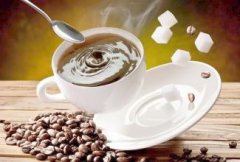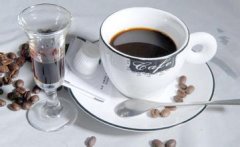Coffee growing situation of Renas Manor in El Salvador with balanced, soft and good texture.

El Salvador's coffee accounts for 40% of the country's exports, and it is usually picked in November, December and January-March of the following year. The export of raw beans lasts almost all year round. Coffee is produced in seven of the country's 14 provinces, with the largest number in the northwestern provinces of chalatenango and santa ana. El Salvador produces 100% Arabica coffee, 68% of which is bourbon, which usually grows at an altitude of 1062 Mel 1972 meters. On the other hand, El Salvador has a unique mountain, river and plateau, which provides a suitable environment for the growth of bourbon coffee. At the same time, El Salvador's suitable temperature, abundant precipitation and fertile soil are also indispensable natural conditions for breeding high-quality coffee beans. Like other typical island beans, Salvadoran coffee is balanced, soft and good in texture.
The national emblem of El Salvador was used on September 15, 1912. The national emblem is an equilateral triangle. The three yellow lines of the triangle represent equality, truth and justice. Five volcanoes rise between the Pacific Ocean and the Atlantic Ocean, symbolizing the five countries in Central America. The "pole of freedom" and the red "cap of freedom" stand high on the top of the mountain, emitting the light of freedom and liberation. In the golden light, September 15, 1821 is the day of El Salvador's independence, and the rainbow in the sky overflows with joy and hope. Five Central American federal flags revolve around the national emblem, expressing El Salvador's desire to reorganize the federation. At the bottom is a yellow ribbon with "God, Solidarity and Freedom" written in Spanish. The green laurel branches and leaves surround the periphery of the triangle, making the national emblem round. The outermost golden Spanish reads: "the National Assembly of El Salvador in Central America implements a unicameral system, with a total of 84 members, of whom 64 are distributed according to the proportion of the population of each province, and the remaining 20 are determined according to the number of votes obtained. The term of office is 3 years and can be re-elected. The latest parliament was established in May 2015 and its term of office lasts until April 2018, including 35 seats for the nationalist Republican Union, 31 seats for the Marty Front, 11 seats for the Grand Alliance of National Unity, 4 seats for the National Reconciliation Party and 3 seats for other parties. Lorena Pena (LorenaPe ñ a), Speaker of the Marty Front, served until November 7, 2016, followed by Guillermo Gallegos, a member of the Great Union of National Unity, who replaced him as Speaker. El Salvador's judicial power is exercised by the Supreme Court and the Procurator-General's Office until April 2018. The Supreme Court is composed of 15 judges (including the President) and is elected by Parliament. The President of the Supreme Court shall serve for a term of five years and shall be eligible for re-election. Judges are appointed for a term of nine years, with 1/3 re-elected every three years. The Attorney General shall be elected by Parliament for a term of three years and shall be eligible for re-election. Oscar Armando Pineda Navas (Oscar Armando Pineda Navas), president of the Supreme Court, took office in August 2014. Attorney General Sonia Elizabeth Cortez de Madeleine (female, Sonia Elizabeth Cort é z de Madriz), took office in January 2010 and was re-elected in January 2013
El Salvador, located in the northwest of Central America and bordered by the Pacific Ocean to the south, is one of the birthplaces of the ancient Mayan civilization. The nearby volcanoes, plateaus, lakes and bathing beaches along the Pacific coast are all very pleasant. But El Salvador is most famous for its unique, mild-flavored coffee.
El Salvador is one of the small countries in Central America with a very dense population. People here love coffee. The coffee in El Salvador tastes well balanced. Salvadoran coffee exports account for 40% of the country's exports. The best quality coffee is exported from January to March each year, and 35% of the extra hard beans are exported to Germany. In the early 1990s, due to the impact of war, the national economy of El Salvador was greatly damaged, even destroyed. As a result, the output of coffee decreased from 3.5 million bags in the early 1970s to 2.5 million bags in 1990-1991.
In El Salvador, the coffee beans rich in the Kuskabapa region are the best, slightly lighter, fragrant, pure and slightly sour. Like Guatemala and Costa Rica, coffee in El Salvador is graded according to altitude, and the higher the altitude, the better the coffee. The best brand is Pip, whose quality has been recognized by the American Organic Certification Society. Another rare coffee is Parkmara, a hybrid of Pacas coffee and Marago Rippi coffee, best produced in western El Salvador, adjacent to Santa Ana, which is close to the border with Guatemala. Parkmara coffee is full-grained, but not very fragrant
The Republic of El Salvador, located in the north of Central America, is the most populous country in Central America. The country is bordered by Honduras to the north, the Pacific Ocean to the south and Guatemala to the northwest. The national economy is dominated by agriculture, and the main crops are coffee and cotton. El Salvador is also one of the birthplaces of ancient Mayan culture, with not only distant culture, but also beautiful scenery such as volcanoes, plateau lakes and beaches along the Pacific coast.
The topography here is mainly mountainous and plateau, with many volcanoes. Savanna climate. The plain area belongs to the tropical rain forest climate and the mountain area belongs to the subtropical forest climate. The average annual temperature is 25-28 ℃, and the annual precipitation is more than 1800 mm in mountainous areas and about 1000 mm in coastal areas. It is rich in water resources, short and swift rivers and volcanic lakes.
Important Notice :
前街咖啡 FrontStreet Coffee has moved to new addredd:
FrontStreet Coffee Address: 315,Donghua East Road,GuangZhou
Tel:020 38364473
- Prev

A brief introduction to the origin of coffee flavor and taste characteristics of Renas Manor in El Salvador
Salvadoran coffee ranks side by side with Mexico and Guatemala as the producers of Asa and Merdo, and is fighting for the top one or two places in China and the United States with other countries. The highlands of origin are large coffee beans of all sizes, which are fragrant and mild in taste. Like Guatemala and Costa Rica, coffee in El Salvador is graded according to altitude, and the higher the altitude, the better the coffee
- Next

Description of coffee grinding degree, taste and flavor of Renas Manor in El Salvador A brief introduction to the origin of fine coffee
From its independence in 1821 to 1978, Honduras has had 139 coups, making it one of the countries with the most frequent coups in Latin America. The civil war caused chaos and affected economic development, but ironically allowed the ancient coffee to be preserved, and the situation was so chaotic that coffee producers in El Salvador failed to catch up with the renewal of coffee varieties in Central and South America. Honduras in 1821
Related
- Does Rose Summer choose Blue, Green or Red? Detailed explanation of Rose Summer Coffee plots and Classification in Panamanian Jade Manor
- What is the difference between the origin, producing area, processing plant, cooperative and manor of coffee beans?
- How fine does the espresso powder fit? how to grind the espresso?
- Sca coffee roasting degree color card coffee roasting degree 8 roasting color values what do you mean?
- The practice of lattes: how to make lattes at home
- Introduction to Indonesian Fine Coffee beans-- Java Coffee producing area of Indonesian Arabica Coffee
- How much will the flavor of light and medium roasted rose summer be expressed? What baking level is rose summer suitable for?
- Introduction to the characteristics of washing, sun-drying or wet-planing coffee commonly used in Mantenin, Indonesia
- Price characteristics of Arabica Coffee Bean Starbucks introduction to Manning Coffee Bean Taste producing area Variety Manor
- What is the authentic Yega flavor? What are the flavor characteristics of the really excellent Yejasuffi coffee beans?

